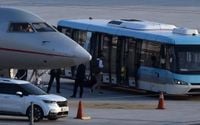Donald Trump Jr., the son of former U.S. President Donald Trump, has made a notable visit to South Korea at the invitation of Shinsegae Group Chairman Chung Yong-jin. Arriving at Gimpo Airport on April 29, 2025, Trump Jr. is set to engage in a series of private meetings with major South Korean business leaders over a two-day period.
Trump Jr. touched down at the Seoul Gimpo Business Aviation Center around 6:25 PM, having traveled on a private jet. He avoided the press upon arrival, quickly departing the airport in a waiting car. His visit marks his first return to Korea in eight months, following his attendance at the 'Build Up Korea 2024' political conference in August of last year. This trip is also significant as it is his first since his father's inauguration in January 2025.
The invitation from Chairman Chung, who is known to have a close relationship with Trump Jr., comes at a time when U.S. trade pressures are intensifying. There has been a concerted effort from the domestic business community to establish a bridge for communication with the Trump administration, a role that Trump Jr. is expected to fulfill during his stay.
Scheduled for April 30, 2025, Trump Jr. will hold a series of relay meetings with leaders of major companies, with an estimated total of around 20 attendees expected. Among those likely to participate are Samsung Group Chairman Lee Jae-yong, SK Group Chairman Choi Tae-won, CJ Group Chairman Lee Jae-hyun, and Hanwha Group Vice Chairman Kim Dong-kwan. Notably, Hyundai Motor Group Chairman Chung Eui-sun is unlikely to attend due to overseas commitments, and Lotte Group Chairman Shin Dong-bin is currently in Indonesia, leading an economic delegation.
Sources indicate that companies with substantial U.S. business interests, particularly in sectors such as semiconductors, automobiles, energy, electronics, steel, and defense, are eager to engage with Trump Jr. This interest underscores the potential implications of his visit for ongoing U.S.-Korea trade negotiations.
Trump Jr. is expected to listen closely to the concerns of the business leaders during these meetings. Each session is anticipated to last about an hour, providing ample time for dialogue. However, it has been confirmed that he will not be meeting with any government officials during this trip, as such meetings would typically require prior consultation with the White House.
The significance of Trump Jr.'s visit is amplified by the backdrop of U.S. trade policy, particularly following the Trump administration's recent decision to grant a 90-day grace period on reciprocal tariffs with South Korea. Despite this temporary reprieve, anxiety remains high among South Korean export companies and associated organizations regarding future trade relations.
Chairman Chung's invitation to Trump Jr. is rooted in their longstanding friendship, which has included personal visits, such as a recent stay at Mar-a-Lago, Trump's Florida resort, where they spent five nights together last December. This personal connection is expected to facilitate open discussions about business interests and trade relations.
During his previous visit to Korea, Trump Jr. engaged with various political and business figures, fostering relationships that are likely to benefit the current discussions. His role as an informal ambassador for U.S. business interests in Korea is reinforced by his family's ongoing influence in American politics.
As the meetings unfold, all eyes will be on the outcomes, particularly how they might influence U.S.-Korea relations and the broader business landscape. Many in the South Korean business community are keenly aware of the stakes involved, especially in light of the current economic climate and the pressing need for clarity on trade policies.
In summary, Trump Jr.'s visit is not just a social call but a strategic engagement aimed at strengthening ties between U.S. and South Korean businesses amidst a complex trade environment. The discussions that take place over the next couple of days could have lasting implications for both countries as they navigate their economic future.





